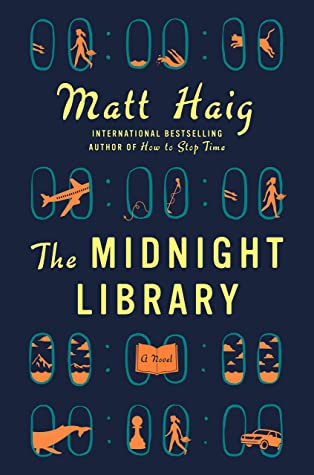Table of Contents
I recently read a book called The Midnight Library, by Matt Haig. I’ll start off by saying the book was fine. Not amazing, but good enough to keep me entertained from start to finish.
But by the time I completed The Midnight Library, I was left with a sour taste in my mouth. I was irritated by one aspect of the book above all. And I couldn’t get past it.
Intro to the Midnight Library

The book dove into the life of a woman who was blessed with loads of incredible abilities, from being a fantastic singer/songwriter to being an exceptional swimmer. But she made lots of choices over the years leading her to where she was now, a woman who was nowhere near where she wanted to be in life. Depressed. And she had made up her mind that the world didn’t need her, and she and everyone else in her life would be better off if she took her own life.
What transpired next was a fantasy-filled trek through what her life might have been if she made different decisions, a la Ebenezer Scrooge. And ultimately the theme of the book is to never look back at the decisions you made with regret, and learn to live in the present. Life is and can be great if you own your decisions and make peace with them, and think about the future as an unwritten script that you can craft and make fantastic.
Where it Went Wrong

I can get over the mediocre book. And I can get past the fact that The Midnight Library had a really strong and meaningful start, then dove into a hard to really appreciate fantasy world that’s not my cup of tea.
My sticking point was the ultimately cavalier attitude and approach to some painfully complex ideas, such as depression and suicide.
Fact is, these are problems that aren’t going to be solved through philosophy or books with feel-good endings. No one seriously contemplating the end of their life will read several hundred pages of a novel, put it down, and say, “Ah, I had it all wrong. Things aren’t so bad. I just need to stop regretting and start living my life with a certain level of happiness behind my every decision.”
It’s not a reality for the average clinically depressed person. And it paints a picture for those who watch their loved ones suffering from the sidelines that can be both confusing and perhaps even detrimental.
Depression is Not Simplistic

There are chemical reactions happening in a brain. Something’s not firing the way it’s supposed to.
And yes, on television we can give someone a two-minute speech that turns their whole life around, but in real life problems are a lot harder to solve. And years of therapy can, of course, be quite helpful. But there are no guarantees. And sometimes drugs will be necessary. And even that is no guarantee depression will be staved off and death will be kept at bay.
Those of us whose lives have been touched and permanently impacted by someone or several people who have taken their own lives look at a book like this and wonder how anyone could present these ideas so simplistically.
Everyone out there, please know: If you cut a major artery or swallow a bottle of prescription meds, you will not enter a fantasy world in which you will get to experience all the different ways your life could have been.
Most likely the results will be swift and deadly, and you will leave a world behind that is overwhelmed with grief and sadness. And blames itself for not doing more to help you.
The Blame Effect

The first time my life was touched by suicide, I witnessed a phenomenon I’d never seen before. I watched a whole room blame themselves for what happened, with some of the shoddiest logic you can imagine. People would say things like, “We were supposed to hang out two years ago, but I had to cancel. I wonder if this is because of me. Is this all my fault?”
Everyone was doing some form of this.
Why? Because we want to be better friends. And because we’re trying to make sense of the senseless. We’re trying to understand something far beyond our grasp. And we head in the only direction we can actually understand: Self-blame.
Blame is easy. Blame in convenient.
The truth is neither.
It’s Not Enough
The fact is everyone in that room could have done everything they now realized they didn’t do and more, and the results could have been exactly the same. Something was wrong. And likely bottled inside, not fully obvious, even to those closest to him. It’s not your fault if you can’t see the invisible thing that no one else can see either.
And that’s why the theme of The Midnight Library concerns me so much.
Learning how to take ownership of your decisions is not enough. Learning how to fight against the pernicious emotion of regret will fall short. And the contemplation of lives you may have led will not only not cure most depression. It may even exacerbate the problem.
A Responsibility Arises

Again, I didn’t hate The Midnight Library. From a literary standpoint, it was not my favorite book. But capturing my attention should not have been the sole purpose of the book. It’s trying to make a difference, and I think it sends us a little backwards.
If you are suffering, or know someone who’s suffering, recommend a therapist or encourage real medical help. Be a friend. Be a listening ear and a shoulder to cry on. But I would not tell them to set aside several hours to read this book.
You may argue that in the big picture it does not matter. A book is just a book. It doesn’t have to be more than story telling. And I completely sympathize with that approach.
However, I think when the subject of suicide arises, perhaps even mental health in general, a responsibility arises along with it. We can’t be careless. We can’t be carefree. We share a collective, societal responsibility. And we need to send clear, intelligent, and caring messages that hit the mark. Otherwise we’re not making the world a better place.
We’re just writing a book.
But there are so many topics to write about. Why bring up one so dark and dreadful if not to make a difference?



